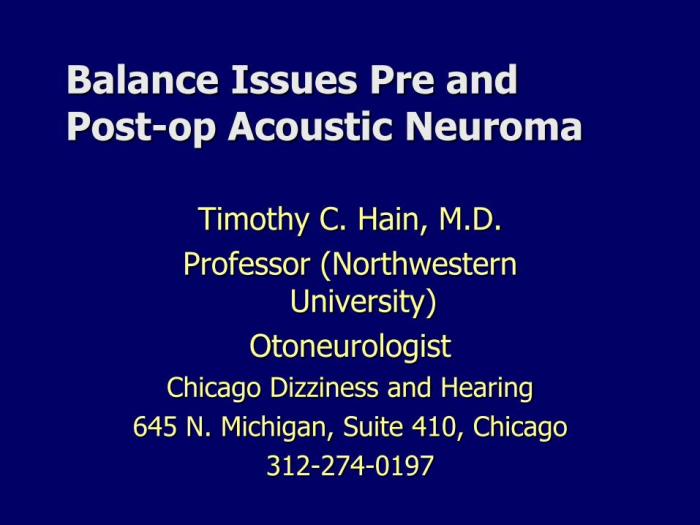Translate the term otoneurologist as literally as possible – Translate the term “otoneurologist” as literally as possible, and the meaning becomes clear: “ear-neurologist.” This term aptly captures the specialized field of medicine that focuses on the intricate relationship between the ear and the nervous system.
Otoneurologists are medical professionals who have undergone extensive training to diagnose and treat a wide range of conditions affecting the ear and the neurological structures that control hearing and balance.
Etymology of the Term “Otoneurologist”

The term “otoneurologist” is derived from the Greek language and literally means “ear and nerve specialist.” It is composed of three components: oto, meaning “ear”; neuro, meaning “nerve”; and -logist, meaning “specialist.” Thus, an otoneurologist is a medical professional who specializes in the diagnosis and treatment of disorders affecting the ear and neurological system.
Scope of Practice
Otoneurology is a subspecialty of medicine that focuses on the diagnosis and treatment of disorders of the ear and neurological system. Otoneurologists are highly trained physicians who have completed specialized training in both otolaryngology (ear, nose, and throat) and neurology.
They are skilled in performing a variety of diagnostic tests, including audiometry, electronystagmography, and vestibular evoked myogenic potentials. Otoneurologists also provide medical and surgical treatment for a wide range of conditions, including hearing loss, tinnitus, dizziness, and balance disorders.
Related Disciplines: Translate The Term Otoneurologist As Literally As Possible
Otoneurology overlaps with a number of other medical disciplines, including otolaryngology, neurology, neurosurgery, and ophthalmology. Otoneurologists work closely with these other specialists to provide comprehensive care for patients with ear and neurological disorders.
Patient Populations
Otoneurologists typically see patients with a variety of ear and neurological disorders, including hearing loss, tinnitus, dizziness, and balance disorders. These disorders can be caused by a variety of factors, including age-related changes, noise exposure, head injuries, and underlying medical conditions.
Early diagnosis and intervention are important for preventing or minimizing the effects of these disorders.
Diagnostic Techniques

Otoneurologists use a variety of diagnostic techniques to evaluate patients with ear and neurological disorders. These techniques include:
- Audiometry: This test measures hearing sensitivity and can help diagnose hearing loss.
- Electronystagmography: This test measures eye movements and can help diagnose dizziness and balance disorders.
- Vestibular evoked myogenic potentials: This test measures the electrical activity of the muscles in the head and neck and can help diagnose balance disorders.
- Imaging studies: These studies, such as CT scans and MRI scans, can help visualize the structures of the ear and brain and can help diagnose a variety of disorders.
Treatment Options

Otoneurologists offer a variety of treatment options for ear and neurological disorders, depending on the underlying cause of the disorder. These treatments may include:
- Hearing aids: These devices can help improve hearing in patients with hearing loss.
- Tinnitus maskers: These devices can help reduce the severity of tinnitus.
- Vestibular rehabilitation therapy: This therapy can help improve balance and reduce dizziness in patients with balance disorders.
- Surgery: Surgery may be necessary to treat some ear and neurological disorders, such as tumors or infections.
Research and Innovation
Otoneurologists are actively involved in research to improve the diagnosis and treatment of ear and neurological disorders. Recent advances in research have led to the development of new diagnostic techniques and treatments, such as:
- Cochlear implants: These devices can help restore hearing in patients with severe hearing loss.
- Deep brain stimulation: This therapy can help reduce the severity of tinnitus and balance disorders.
- Gene therapy: This therapy has the potential to treat a variety of genetic ear and neurological disorders.
Frequently Asked Questions
What is the primary focus of otoneurology?
Otoneurology focuses on diagnosing and treating disorders that affect the ear and the neurological structures responsible for hearing and balance.
What is the educational background of an otoneurologist?
Otoneurologists typically complete medical school followed by specialized training in otolaryngology (ear, nose, and throat) and additional subspecialty training in otoneurology.
What are some common conditions treated by otoneurologists?
Otoneurologists treat a wide range of conditions, including hearing loss, tinnitus, dizziness, vertigo, and balance disorders.